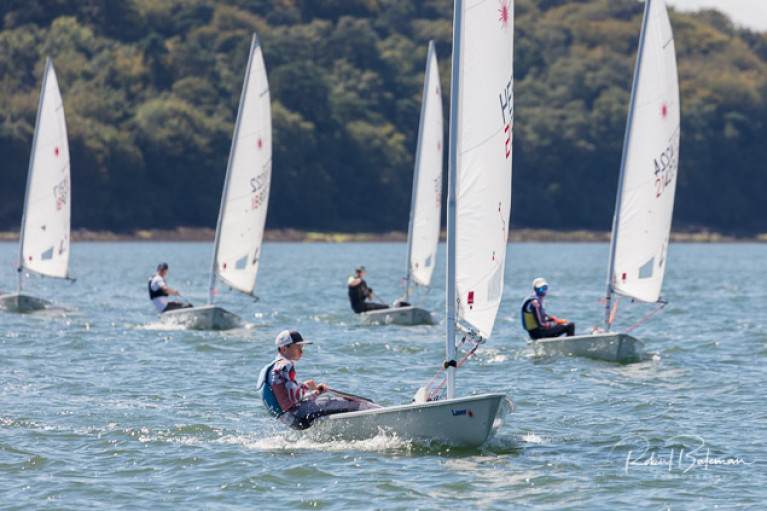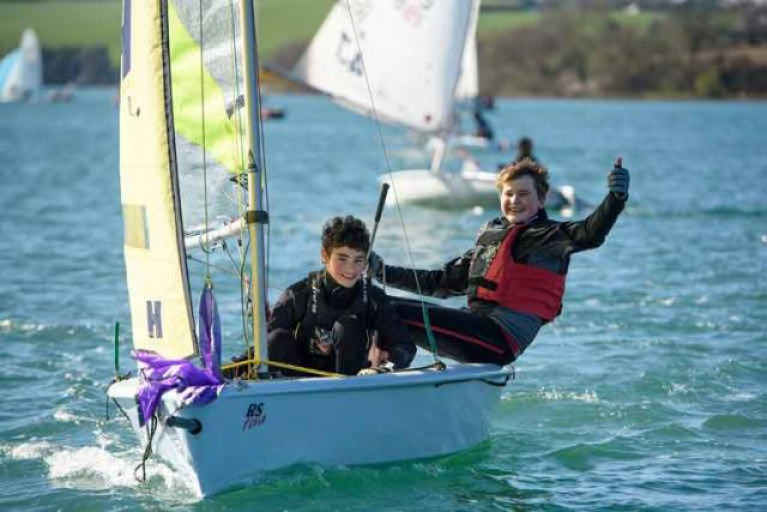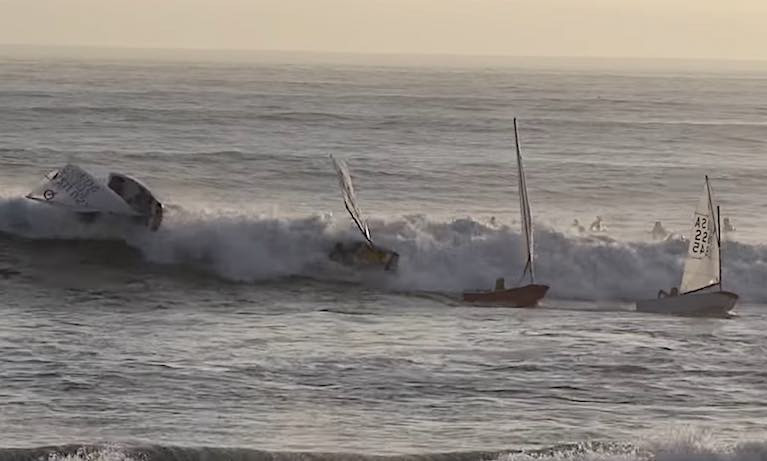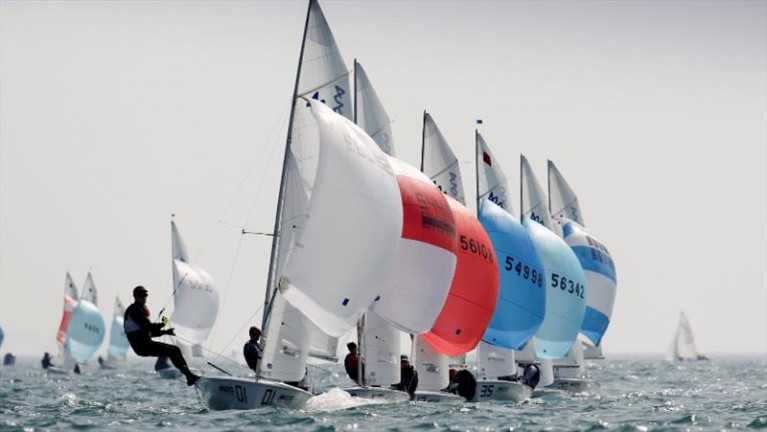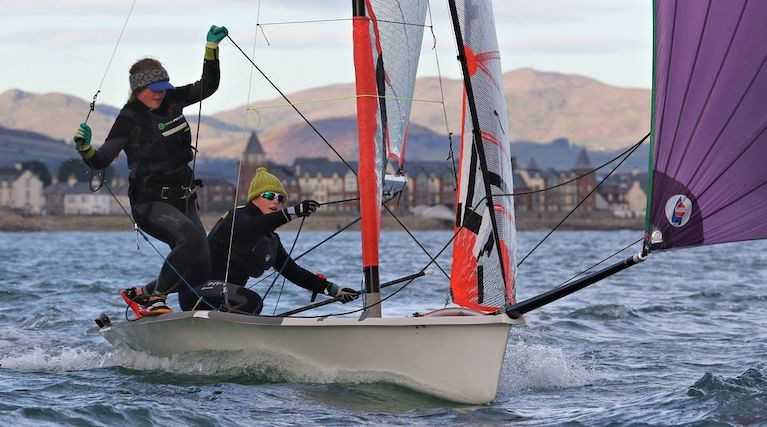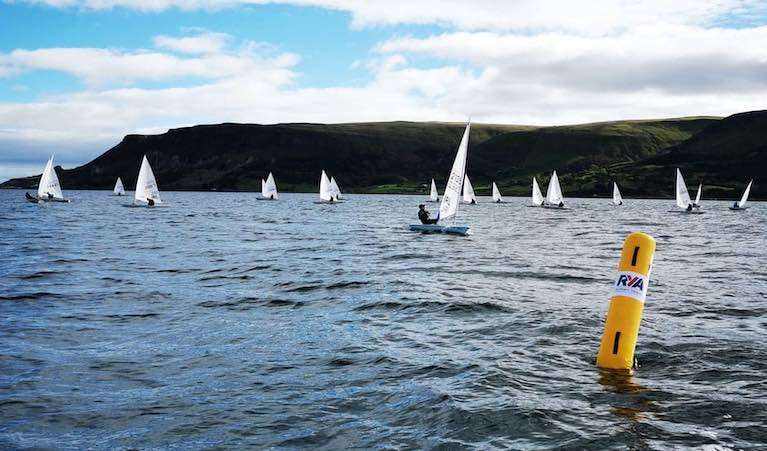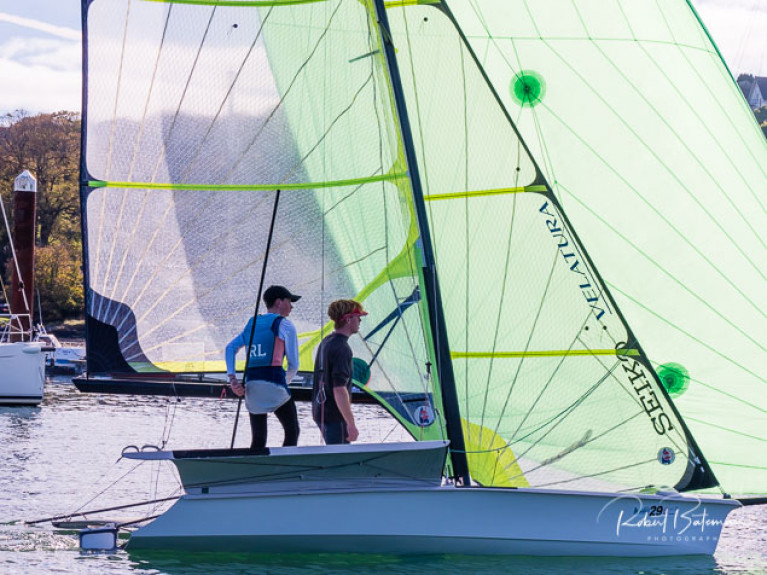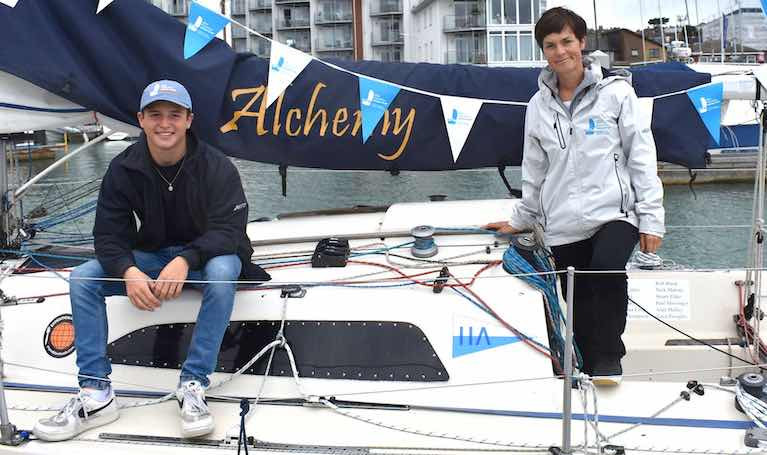Displaying items by tag: youth sailing
Getting Young People Back Sailing in Cork Harbour
Clubs are hoping to get young sailors back into activity with the easing of restrictions on training. However, as in all sports, there is some concern about the effects of the lengthy restrictions on youth's interest in sport.
Principal Coach at the Royal Cork in Crosshaven, Ben Fusco, says: "We are looking forward to the return to Junior Coaching on the May weekend. Preparations are well underway to get all of our junior and youth sailors back on the water and shaking off the cobwebs of an extended off-season. We have a robust training plan in place for each of the Classes."
With the easing of restrictions for junior training, Monkstown Bay SC in Cork Harbour says that it will be starting its Sunday morning coaching sessions for Optimists. It has also opened applications for this year's sailing courses.
Applications will close at the end of May, the club says.
More Young Sailors Going Offshore is an Encouraging Trend - SCORA's Daragh Connolly
More young sailors are interested in racing offshore, an encouraging trend that should be fostered. It can help to bridge the problems that have been encountered in sailing where younger sailors have been lost to the sport in bridging the gap from dinghy to cruiser racing.
Younger sailors have been featuring more in South Coast racing and are included on the crews of leading Cork boats.
The newly-elected Commodore of the South Coast Offshore Racing Association (SCORA), Daragh Connolly, sees this as a particularly positive and encouraging trend.
 Daragh Connolly, the new Commodore of SCORA. Listen to him on the podcast below Photo: Bob Bateman
Daragh Connolly, the new Commodore of SCORA. Listen to him on the podcast below Photo: Bob Bateman
 Noel Coleman's Blue Oyster is registered for August's Fastnet Race Photo: Bob Bateman
Noel Coleman's Blue Oyster is registered for August's Fastnet Race Photo: Bob Bateman
"I cut my teeth in coastal, offshore racing. It is an exciting part of the sport and I'm encouraged and very positive about this. It is part of the renewed and growing interest in coastal racing," he says in this week's podcast, where he also talks about liaising with ISORA, the successful 450 Dun Laoghaire to Cork Race and the three south coast yachts which have entered for the Fastnet Race.
 Denis and Annamarie Murphy's Nieulargo from Royal Cork was the winner of the inaugural Fastnet 450 Race and will compete in August's Fastnet Race Photo: Bob Bateman
Denis and Annamarie Murphy's Nieulargo from Royal Cork was the winner of the inaugural Fastnet 450 Race and will compete in August's Fastnet Race Photo: Bob Bateman
There are two boats from his own club and one from that of the new Vice-Commodore of SCORA, Dave Cullinane from Kinsale YC. From the RCYC - Noel Coleman's Blue Oyster and Denis/Annemarie Murphy's Nieulargo. From Kinsale Cian McCarthy's Cinnamon Girl.
 Cian McCarthy's Sunfast 3300 Cinnamon Girl from Kinsale Yacht Club is entered as a 'double-hander' for August's Fastnet Race Photo: Bob Bateman
Cian McCarthy's Sunfast 3300 Cinnamon Girl from Kinsale Yacht Club is entered as a 'double-hander' for August's Fastnet Race Photo: Bob Bateman
"For the season ahead, perhaps offshore could start on the Cork coast even if with restricted crewing. More racing outside Cork Harbour will be a positive experience for SCORA boats and challenging. The entry of 21 boats for last year's Navy Race, which was switched from inside to outside the harbour due to the Covid situation, showed the interest and that included white sail as well as spinnaker. There is a positive role here for more development and I am positive and hopeful. Despite the challenges which we face from Covid which has impacted so much on sailing, as soon as we have the clearance to go, you can be sure that SCORA will be there and ready. Despite the difficulties and challenges, I am positive for the future. We have a good team in place at SCORA and will carefully plan for the season ahead, allowing for the restrictions and limitations in place at present."
Listen to the podcast below
2021 Irish Sailing Youth Nationals Moves to October at Royal Cork
Less than a week after Irish Sailing said it was 'proceeding as planned' with its Youth Sailing Nationals event in April at Royal Cork Yacht Club, the national governing body announced yesterday it was shelving its Easter date for Cork Harbour and postponing the event due to ongoing COVID restrictions.
Such are the times we live in that the 2021 sailing fixture list is now subject to change. Racing for 29ers, 420s, Toppers, Laser 4.7, and Laser Radial will now be held at Royal Cork from 28-31 October.
Irish Sailing coach Sean Evans said “We could see during the month that the numbers weren’t coming down quickly enough and that Level 5 restrictions would be likely to continue. That’s why we had already planned in an alternative October date. Now that the longer restrictions are confirmed, we’re putting this new plan in place".
Irish Optimist Trials
Meanwhile, the Irish Optimist Trials, that normally formed part of the Youth Nationals regatta, will race separately in May at the Royal St. George Yacht Club as Afloat reported here. While COVID lockdown has restricted plans for pre-trials training, coach Peter Fagan has been updating on the Dun Laoghaire Optimist Group 'DOGs' programme here.
The Irish youth sailing nationals move follows a similar move in the UK where the RYA has moved its Easter Youth Nationals at Plymouth to August.
Royal Cork Yacht Club Launches Youth Sailing Pathway for 2021
After a year in the planning, Royal Cork Yacht Club has launched a new offering for its youth sailors for 2021.
The pathway is intended to complement our existing entry points into sailing in the club across dinghies and keelboats. From age 7 to 25, total novice to Olympic ambition, male or female, we aim to provide something for everyone and ensure nobody slips through the cracks.
The Club's Alex Barry says the goal is simple, “This pathway is being introduced to ensure that youth members of all abilities have the opportunity to further their skills and enhance their enjoyment of sailing and boating, ultimately gaining a varied set of skills and friendships for life.
More from RCYC here
New Sailing Instruction Module - Santa Cruz Sailing School Does it With Surf….(VIDEO)
They say that a good junior sail training programme will gradually introduce the young people to an increasingly demanding range of experiences afloat. But we doubt if the instructors in Santa Cruz in California at the weekend had had something so extreme in mind when the surf built rapidly at the harbour mouth as the sailing juniors were returning to port, and found themselves in the ultra-embarrassing situation of being rescued by the local surfing dudes.
In truth, embarrassment was probably the last thing on anybody’s mind out there on the water. Staying alive was a bigger priority. And after, that not being seriously injured. Miraculously, no-one was hurt, but the word is some of the boats are in Intensive Care….
RYA Postpones April's 2021 Youth National Championships
The Royal Yachting Association has decided that in light of the current Covid-19 situation it is in the best interests of all parties to postpone its 2021 British Youth Sailing National Championships.
The regatta, the UK’s premier youth racing event, was due to take place from April 4 to 9 hosted by Plymouth Youth Sailing Club in Plymouth, Devon.
Typically, the annual event is attended by some Irish youth sailors, north and south of the border.
With the UK currently in lockdown and likely to revert to the tier system once restrictions ease, the decision has been made to delay the regatta until the summer.
This will give organisers the time to plan for the best possible event, as well as giving time for the nationwide vaccination programme to take effect.
We are also very mindful that the young sailors will have lost training time over the winter and this gives them time to be ready for such an event.
It is hoped the rescheduled event will take place at the same venue the week commencing August 9, 2021. It is intended that further details and any Notice of Race will be shared before the end of January. More here
Young Northern Ireland Sailors Awarded Funding by Mary Peters Trust
Five young sailors have been given a unique chance to boost their training and skills after they were awarded funding from the Mary Peters Trust.
The Trust aims to help aspiring young athletes, whatever their sport or social background, to realise their maximum potential by assisting them in both a financial and advisory capacity. We help young people, both disabled and able-bodied, achieve their sporting dreams and ambitions.
The five are Lauren McDowell, (29er) associated with Royal North of Ireland Yacht Club on Belfast Lough where she also helped instruct the young Pirate section; Erin McElwaine from Newcastle Yacht Club who is crew for Lauren McDowell; Dan McGaughey, from Donaghadee SC on the North Down coast, who won the 2018 Volvo Youth Sailor of the Year award for his performance internationally in the Topper class; Dan Palmer (Topper) from Ballyholme Yacht Club and Tom Coulter form Coleraine YC who sails a Laser Radial.
 Topper sailor Danny Palmer of Ballyholme Yacht Club
Topper sailor Danny Palmer of Ballyholme Yacht Club
They are the worthy recipients of the awards from among 70 young competitors from 20 sports to receive the funding.
Lady Mary, who won Pentathlon gold at the 1972 Munich Olympics, founded her Trust soon afterwards to aid the development of young, homegrown, sporting talent, and in the intervening years has helped many thousands to achieve their sporting goals.
Commenting on the funding awards, Lady Mary said: "Our awards are made to support and accelerate sporting careers. The Trust recognises how difficult it has been to train and compete during the pandemic, and we are delighted to continue their funding in order to provide financial assistance. For over four decades, the Trust has supported our young athletes, and they are fantastic ambassadors for our country. I am proud of all those receiving this latest round of funding for their dedication to continue in their sport during difficult times."
RYA Northern Ireland's Performance Manager, Andrew Baker, commented: "At RYA Northern Ireland, we are very proud of our talented athletes. Funding is always a key issue for aspiring athletes, and it is fantastic that the Mary Peters Trust has invested in our young sailors. This funding will make a big difference and will allow our sailors to develop their skills and continue with their training and competitions."
Youth Sailors Attend RYA Northern Ireland Selection Weekend
More than 30 youth laser sailors from 10 clubs across Northern Ireland travelled to Cushendall Sailing and Boating Club for the RYA Northern Ireland Performance selection weekend.
The event, which took place on 10 and 11 October, saw the young sailors taking part in two days of coaching and selections.
Strict Covid-19 arrangements were in place and sessions took place outdoors in three groups with Laser Head Coach Barry McCartin, Performance Development Officer James Farrell and Performance Manager Andrew Baker.
Commenting on the action-packed weekend, Andrew Baker said: "Saturday was all about boat handling and shaking off any rustiness form a season with less sailing than normal. Gusts of 20 knots were a rude awakening for some. By the end of the day the groups were showing real promise and becoming more competitive within themselves.
"Sunday put into practice the previous day of training with a drill focusing on boat speed and changing gears in a laser. These sessions were aided by the ever-changing weather which had the sailors working the boats through light drifting conditions right up to flat out hiking."
He added: "The weekend concluded with three large races bringing all the groups together giving additional pressure of performing among a larger number of boats, which is what the sailors can expect at future events."
Reflecting on the success of the event, Baker said: "It was a great weekend and I am very pleased given the current Covid-19 climate that we were able to run the Performance selection weekend.
"I am impressed by the enthusiasm shown by all the participants. This was my first selection weekend as Performance Manager and I am pleased to see the talent Northern Ireland has to offer and excited to grow and support our future sailors.
"I would like to thank everyone for understanding the circumstances and helping us run the weekend safely and in accordance with Covid-19 guidelines.''
The successful young athletes who have been selected by RYA Northern Ireland will now be invited to be part of the RYA Northern Ireland Youth Performance Programme and undergo six weekends on-water coaching, as well as other campaign support throughout the Winter period.
Optimist Ace James Dwyer Matthews Takes a Tack in an Olympic 49er
Despite Royal Cork Yacht Club's Seafra Guilfoyle's super efforts at the sharp end of Ryan Seaton's 49er campaign for Tokyo 2021 next year, there's been little in the way of Olympic skiff sailing going on in Guilfoyle's home port for the past two seasons.
These fast and tricky skiffs are a handful for most and this has put them on a downward spiral in Cork Harbour.
So it was interesting to spot Optimist and Laser 4.7 ace James Dwyer Matthews of RCYC trying out a 49er (one of two in active use), with Chris Bateman of Monkstown Bay as his crew.
Guilfoyle, a 2014 world youth silver medalist, meanwhile, continues his campaign for selection in the 49er and is vying with a Dublin crew to win a single Irish berth against stiff competition for one of the final slots available for Japan.
Timothy Long Becomes Youngest Person to Sail Solo Around Britain
Fifteen-year-old sailor Timothy Long spent his summer on a 1,600 nautical mile anti-clockwise voyage around the British coast. Now he has broken the record of Tom Webb, who sailed around Britain aged 17 in 2011. Timothy, from Aylesbury, has become the youngest person to sail solo around Britain while so far raising over £7,000 to support his heroine, Dame Ellen MacArthur's young person's cancer charity (Thursday 1 October).
Ellen MacArthur has been Timothy's greatest inspiration since reading her books as child. When he learned about the Ellen MacArthur Cancer Trust – the national charity that empowers young people aged 8-24 to embrace their future after cancer through sailing and outdoor adventure – he wanted to help. He was too young to volunteer so decided to fundraise. After plucking up the courage to email Ellen – having told his mum "I can't write to her, she's a Dame"- a copy of her book 'Full Circle' and an Ellen MacArthur Cancer Trust baseball cap, both signed by Ellen with the words "Go for it!" arrived out of the blue.
Inspired by Ellen's encouragement and that she had sailed round Britain aged 18, Timothy donned his Trust cap to follow her lead on his 28ft Hunter Impala, 'Alchemy'.
Having set out from Hamble, Southampton on 16 July, Timothy's venture (See Afloat.ie 1st, 6th and 14th September) brought him in early September to Bangor Marina from where he left on 4th September, calling at Ardglass on the County Down coast on his way south. He arrived yesterday (Wednesday 30 September) in the Isle of Wight where he received a warm welcome from Ellen herself, ahead of his final leg to Hamble.
Timothy said: "The Ellen MacArthur Cancer Trust does amazing work with young people to rebuild their confidence after cancer treatment, and the experience of being together on a boat can be a real turning point for people who have been through the worst of times".
Reflecting on his voyage Timothy said "My 20-hour passage between Eyemouth to Stonehaven in Scotland made me think of being in the shoes of the young people the Trust supports. I can't even imagine being diagnosed with cancer at this age, but people are and have to go through years of treatment, it's crazy. How can you return back to normal life after such a terrible experience without the support of the Trust?"
Timothy's first sailed a dinghy on a reservoir near Swindon aged nine. During his voyage, he sailed an average 50 miles per day, with several passages of up to 100 miles. He battled giant waves, gale force winds, 17 hours in thick fog in the Bristol Channel and on occasions sailed for 24 hours straight, sleeping for just 20 minutes at a time. There have been wonderful moments too; of perfect sailing, magical sunrises and sunsets and beautiful scenery and wildlife including dolphins, seals, birds and even a pilot whale.
Ellen said: "It is an incredible achievement for anyone to sail single-handed around Britain, but to do it at 15 really is something else. While Timothy will always have the personal satisfaction of that achievement, the legacy of what he's done will be even more far-reaching in terms of helping to change the lives of young people in recovery from cancer. I send Timothy my warmest congratulations and thank him on behalf of every young person the Trust supports."
To support Timothy go to www.justgiving.com/fundraising/roundbritain2020 and for more information about the Ellen MacArthur Cancer Trust visit www.ellenmacarthurcancertrust.org



























